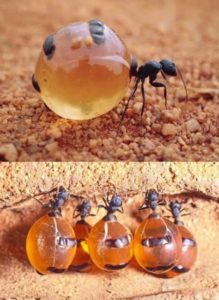In the arid regions of Oaxaca, Mexico, there exists a fascinating insect known as the honey ant. This unique ant produces a delicious honey that is stored in a specialized sac in its abdomen. The honey ant, known locally as “chindudis,” is a delicacy enjoyed by the indigenous Mixtec people.
Habitat and Behaviour:
Honey ants are found in desert areas, where they build underground nests. They are social insects that live in colonies, with each colony consisting of a queen, workers, and soldiers. Honey ants are known for their distinctive behavior of storing honey in their abdomens.
Honey Production:
Honey ants produce honey by collecting nectar from flowers. The nectar is then stored in a specialized sac located next to the ant’s stomach. The sac expands as it fills with honey, giving the ant a swollen appearance.
Harvesting Honey:
The Mixtec people have traditionally harvested honey from honey ants by carefully extracting it from their abdomens. The honey is extracted overnight, allowing the ants to replenish their honey reserves during the day.
Culinary and Medicinal Uses:
Honey ant honey is prized for its sweet taste and unique floral flavors. It is often consumed as a treat or used as a sweetener in traditional Mixtec dishes. In addition to its culinary value, honey ant honey is also believed to have medicinal properties. It is used to treat various ailments, including stomach problems and respiratory issues.
Conservation:
Honey ants are an important part of the desert ecosystem. They play a role in pollination and seed dispersal. However, habitat loss and pesticide use are threats to honey ant populations. Conservation efforts are underway to protect these valuable insects and their unique honey-producing behaviour.
The honey ant of Oaxaca is a fascinating creature that provides a unique and delicious treat. The Mixtec people have a deep appreciation for honey ants and have developed sustainable harvesting practices to ensure their continued existence. By understanding and protecting honey ants, we can preserve this natural wonder and its sweet offerings for generations to come.

Credit: Sylvester Altenwerth
 Pazionmedia.com Pazion Media l Latest News l Politics l Sports l Entertainment
Pazionmedia.com Pazion Media l Latest News l Politics l Sports l Entertainment



